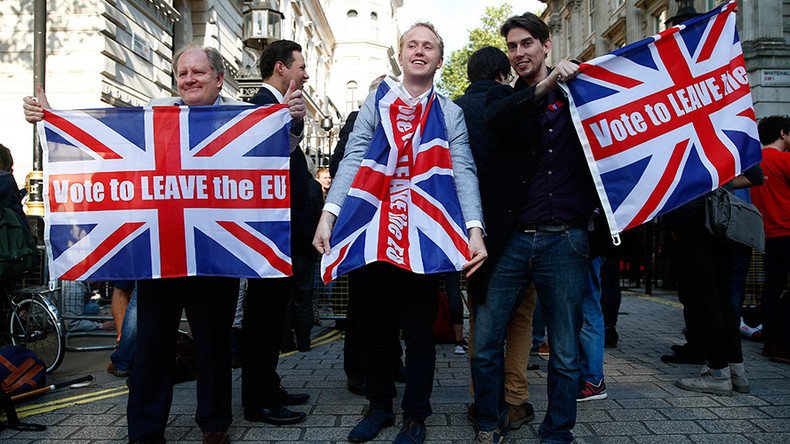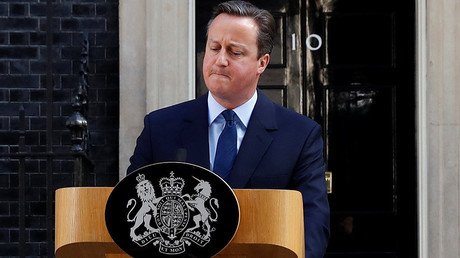'British parliament must obey referendum and leave EU as quickly as possible'

After the UK referendum results showed people voted to leave the EU and David Cameron’s announcement to step down as prime minister within three months, RT discussed with experts the consequences of the Brexit vote.
‘Leaving the EU must not take years’
RT: What is this vote is going to mean for ordinary people in the short-term?
Gerard Batten, UKIP MEP: I think people tend to forget that for the 1500 years between the fall of the Roman Empire and joining the EU in 1973, we are actually an independent democratic nation. And all that we are going to do is assume the status of the other 170 odd countries in the world that are not members of the EU. So, I wouldn’t worry too much if I was them.
And regarding the “convoluted process of withdrawal” under Article 50 of the Lisbon Treaty. I am totally opposed to that. We should get out very quickly, and the way that we can do that is just be repealing the 1973 European Communities Act; parliament would then be sovereign, all of the EU directives have been transposed into acts of parliament so there won’t be any chaos because they are still in place and we can repeal them over a period of two, three, or four years until we get rid of most of the EU legislation, except what we want to be left with.
The decision has come as a shock because many of us had hoped that [David Cameron] would continue in a role as prime minister because of protracted and intricate negotiations that are going to take place over the coming months and years with the EU. But clearly he has made a decision to stand down before the Conservative party conference in October when a new leader will be elected. - Daniel Kawcynski, Conservative MP, told RT
RT: What is a realistic timescale for the UK to extricate itself from the EU?
GB: If we repealed the 1973 Act we could technically be out [of the EU] Monday morning – it depends on how quickly parliament can put it through. If we go down the Article 50 route it could take 2 years or it could take 10 years because this time period can be extended indefinitely. So my view is that we should do it as quickly and cleanly as possible because we don’t want years of political infighting about this. Unfortunately, the situation at the moment is that the Houses of Parliament don’t actually want to leave the European Union. So they must obey the will of the people and the best way to do that is to do it as quickly as possible.
‘Brexit is a massive blow to EU image’
RT: Just how big of a blow is this for the EU? Could the UK referendum indeed have a domino effect in Europe?
Richard Sakwa, Professor of European Politics at the University of Kent: It is a massive blow not only to the actual physical composition, but above all to its image. Up to now the EU has been expanding not just in size but also in self-confidence, despite its many crises, the belief that it was the main representative of peace and development on the continent. Now, the UK leaving is going to challenge that. It may have two consequences where the EU goes now: it could start a chain reaction with more countries deciding to have a referendum. We know Marine Le Pen in France has already called for one. But on the other side it could allow - without the UK - the EU to get on with the business that it has been trying to do and that is to actually make itself a more effective union of people and nations that is in economic and other senses. So it is going to be a shock to the system.
‘Brexit shows a civil war within the Tory party’
RT: Was Britain really prepared for Brexit?
Dan Glazebrook, political writer: I think part of Britain was prepared for it obviously. It is important we understand this is not a blow to the establishment, this is not some kind of modern day peasants’ revolt. This is a split within the establishment, a civil war within the Tory party. There is one set of Eton toffs and buffoons against another set. And the set that won the day was that immobilized mass support on the basis primarily of hostility to foreigners with a little bit of pseudo-left rhetoric thrown in and all within the kind of narrative of a decline of British supremacy on the world stage. And this is all of the basic elements of a kind of proto-fascism, and that is exactly what this Brexit movement was about. And it is going to empower across Europe, unfortunately, and what really should have been a joyous moment as David Cameron - the butcher of Tripoli, the drowner of refugees, the cheerleader of sectarian death squads across the Middle East – is resigning, quitting, going. It should have been a joyous moment but it’s tainted by the fact that he is not resigning at the hands of any of these people by any progressive movement; he is resigning because he has been pushed out by the forces of the far-right and a proto-fascist movement within his own party… any other misery for David Cameron, in any other context, is surely to be applauded.
The statements, views and opinions expressed in this column are solely those of the author and do not necessarily represent those of RT.













